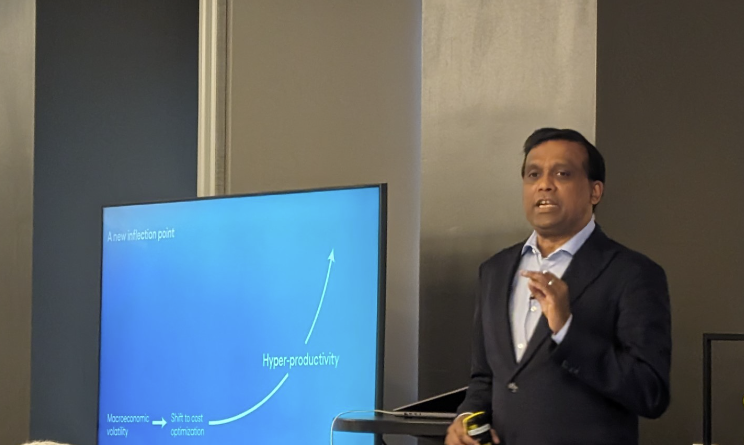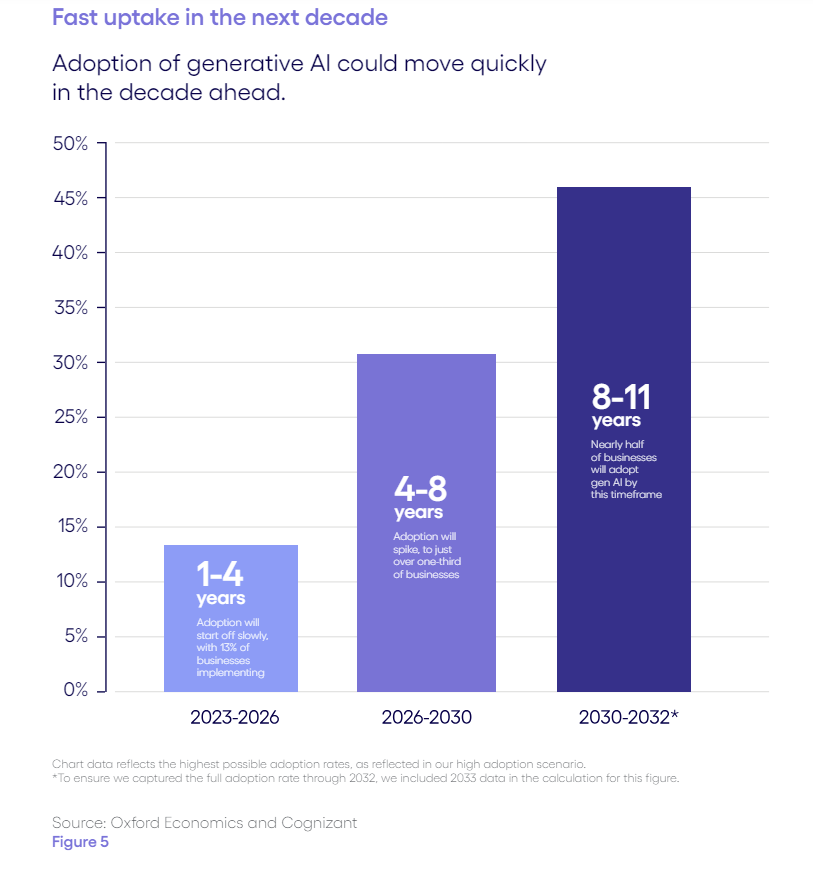Cognizant CEO Ravi Kumar said the technology services firm's customers are preparing for generative AI, but need to do work in quantifying productivity gains to justify costs. Nevertheless, Kumar said generative AI will usher in a hyperproductivity phase that will affect every worker, every process and every enterprise.
Speaking at Cognizant's Analyst Day in New York, Kumar (right) covered how his company is planning for the future, scaling AI and solving long-running industry issues such as technical debt.
Kumar's big take is that generative AI will lower the cost of technology deployment and cut technology debt. "AI will drive a new productivity wave and the biggest industry to embrace AI will be technology. We will have to apply AI on ourselves and as we apply it the cost of technology deployment will change ," said Kumar. "Discretionary spending in tech over the last 25 years has happened in the low interest rate regime where there was no cost of capital. Today you need a business use case for new projects."
In other words, generative AI needs to fund itself if it's really going to transform businesses.
That theme set the agenda for Cognizant's Analyst Day. Constellation Research analyst Doug Henschen said:
"Kumar, CEO of Cognizant since January 2023, took the reins of the company at a challenging time for the systems integration market. As he acknowledged during his opening keynote, deals are mostly focused on cost take out, vendor consolidation, and cost optimization these days rather than transformation or big bets on innovation. With that said, Kumar was optimistic about a next wave of growth triggered by hyper-productivity projects driven by AI. Kumar and Cognizant's CTO, Babak Hodjat, pointed to a next wave focused on carefully curated, multi-agent AI that will be focused, robust and credible. The focus is spot on, as GenAI and LLMs alone will not deliver what Kumar described as "responsible AI" that meets the acid test of addressing safety, trust, and equity simultaneously."
Constellation ShortList™ Public Cloud Transformation Services: Global | Constellation ShortList™ Custom Software Development Services | Constellation ShortList™ Customer Experience (CX) Operations Services: Global
The push and pull of generative AI adoption
Kumar spoke of a push and pull for generative AI demand that may take years to play out. Companies are going to have to step back with a wider perspective and do the productivity studies and think through the orchestration behind generative AI.
When the cost of deployment changes you'll have a new productivity paradigm, said Kumar. "Take that technology cost out and there's an extraordinary opportunity to create hyperproductivity," he said.
"If productivity is driving generative AI, you need the studies to quantify the big use cases," said Kumar. He noted that Cognizant has funded studies and using the framework internally. "We have an AI roadmap internally and have 200 plus use cases we have identified. We have a unique opportunity to be the reference stack," said Kumar. "You have to build the last mile. The last mile is the heavy lift."
Cognizant is using its own platforms such as Neuro AI, Skygrade and Flowsource and using a "tech for tech" approach for development. The idea is to use Cognizant's platforms to drive innovation that's self-funded with productivity savings.
- Copilot, genAI agent implementations are about to get complicated
- Generative AI spending will move beyond the IT budget
- Enterprises Must Now Cultivate a Capable and Diverse AI Model Garden
- Secrets to a Successful AI Strategy
- Return on Transformation Investments (RTI)
- Financial services firms see genAI use cases leading to efficiency boom
- Foundation model debate: Choices, small vs. large, commoditization
Kumar added that Cognizant has more than 500 prototypes in the pipeline for generative AI as well as another 500 that have graduated to production. "To have the license to talk to a client you have to apply generative AI on yourself. Our biggest use case for AI is deploying it in the technology development cycle," said Kumar. "We will use AI to disrupt the operating model for the company."
So, what's the holdup for this generative AI boom?
Kumar said enterprises are reluctant to go all in without quantifiable returns. He said:
"Why is it that companies are not jumping the gun on this? The business case doesn't stack up in most places. Let's take the example of copilots. Every company has done small cohorts of copilots but companies are not going all out because the productivity studies are not complete and comprehensive. Productivity will be the first lever and it is related to business transformation and process transformation."
To help break this log jam, Kumar said Cognizant is mapping enterprise operations, tasks and roles for enterprises and itself. "We are client zero on this," he said.



